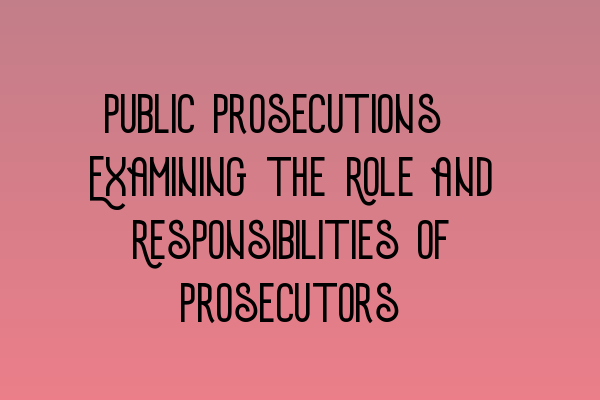Public Prosecutions: Examining the Role and Responsibilities of Prosecutors
Public prosecutions play a vital role in the criminal justice system, as prosecutors are responsible for presenting the case against individuals accused of committing crimes. Their primary duty is to act in the public interest and ensure a fair and just legal process. In this blog post, we will explore the role and responsibilities of prosecutors in more detail.
The Role of Prosecutors
Prosecutors, also known as Crown Prosecutors, are legal professionals who represent the state or government in criminal cases. Their primary duty is to evaluate the evidence gathered by law enforcement agencies and determine whether there is sufficient evidence to bring charges against the accused.
Once prosecutors decide to pursue a case, they are responsible for presenting the evidence and arguments in court. They must build a strong case against the defendant, utilizing their legal knowledge, investigative skills, and expertise in criminal law.
Prosecutors act as advocates for justice and are expected to act independently and impartially. It is their duty to provide the court with all relevant evidence and ensure a fair trial for both the accused and the victim. This impartiality includes disclosing any evidence that may be beneficial to the defense.
Responsibilities of Prosecutors
Prosecutors have numerous responsibilities throughout the life cycle of a criminal case. These include:
- Reviewing Evidence: Prosecutors thoroughly examine the evidence gathered by law enforcement agencies, including witness statements, forensic reports, and any other relevant material. This process helps them determine the strength of the case and whether prosecution is in the public interest.
- Decision Making: Based on the evidence, prosecutors decide whether to bring charges against the accused. They consider factors such as the seriousness of the crime, available evidence, public interest, and any potential mitigating or aggravating circumstances.
- Courtroom Representation: Prosecutors represent the state in court proceedings, presenting the case against the accused. They examine witnesses, introduce evidence, and argue on behalf of the state to secure a conviction.
- Victim Support: Prosecutors must take the rights and needs of victims into consideration. They provide support to victims throughout the legal process, ensuring their voices are heard in court and that justice is served.
- Professional Conduct: Prosecutors must adhere to professional and ethical standards. They should act with integrity, professionalism, and honesty throughout the entire criminal justice process.
These responsibilities require prosecutors to possess a deep knowledge of criminal law, excellent communication skills, and the ability to make sound decisions in the interest of justice.
Conclusion
In conclusion, public prosecutions play a crucial role in the criminal justice system. Prosecutors are responsible for evaluating evidence, making informed decisions, and advocating for justice on behalf of the state. A fair and effective criminal justice system relies on the professionalism and integrity of prosecutors.
For more information on related topics, please check out these articles:
- SQE 1 Practice Exam Questions
- SQE 1 Practice Mocks FLK1 FLK2
- SQE 2 Preparation Courses
- SQE 1 Preparation Courses
- SRA SQE Exam Dates
